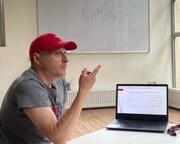In the period from 18 to 21 June, in Tbilisi, Georgia, a working meeting of the Board members, employees and representatives of UnMode from Ukraine, Georgia, Moldova, Kyrgyzstan, Belarus and Russia was held.
The first day of the working meeting of UnMode members, among other things, included presentations from countries where UnMode is represented on the situation of prisoners and people who use drugs in the first half of 2022. Particular attention was paid to the impact of the war on human rights among vulnerable groups in Ukraine and Russia.
The first to speak was Ivan Anoshkin, an UnMode human rights activist from Tolyatti, Russia:
“In total, in 2021, 352,000 people were kept in correctional colonies of the Russian Federation. Of these, 103,000 were under anti-drug articles, that is, almost one third.
Despite the fact that over the past 10 years the number of convicts has decreased by 40%, the number of convicts for drugs has decreased only by 21%, and the total proportion of convicts for drugs has increased.
In addition, Ivan spoke about the violations of the rights of prisoners in places of deprivation of liberty, the following was noted:
- more frequent signals about changing ARVT without the necessary diagnostics;
- there is increasing information about the lack of medicines for the treatment of tuberculosis in prisoners;
- access to civilian hospitals is practically inaccessible;
- the administration of correctional facilities prevents human rights activists from accessing their clients.Some colonies do not issue medical records for independent examination;
Russia withdrew from Europe, the decisions of the ECHR will not be implemented in the Russian Federation, human rights activists expect the situation of prisoners to worsen;
prisons are overcrowded: for example, in Butyrka and Matrosskaya Tishina the limit is exceeded by 29% and 27.7%. People are forced to sleep on the floor;
Three Ukrainian citizens have been on a hunger strike at the Center for Antiretroviral Treatment in the Samara region since May 26, due to non-provision of ART and an uncertain procedural status. Friendly journalists were involved, the situation was publicized and it turned out that such a problem is of a systemic nature. At present, the few remaining human rights organizations in Russia have joined in resolving the issue.
There were reports that prisons were being emptied near the border with Ukraine and Ukrainian prisoners of war were being placed there. Lawyers have difficult access to them, many do not have procedural status, and it is difficult to obtain information about the situation of this category of prisoners.
Ivan ended his speech with success stories from the Kaliningrad, Sverdlovsk and Samara regions of Russia. During the last year of work of UnMode human rights activists in these regions, 20 people were released from prison due to health reasons. All of them were released as a result of lengthy trials, some of those released are being treated in civilian hospitals and have a good chance of saving their lives.
Yulia Kogan and Yanina Stemkovskaya, human rights activists at UnMode, spoke about the situation in Ukraine and their work during the war.In wartime conditions, one of the most pressing issues in the field of prisoner health remains the issue of ensuring the necessary and continuous treatment of vulnerable groups of the population. One of these groups are persons dependent on psychoactive substances. The most effective treatment is opioid substitution therapy. In wartime, ensuring access to medicines is becoming increasingly important. According to our data, about 17,844 people are currently undergoing substitution therapy. Since the outbreak of hostilities, the total number of people transferred to substitution therapy has amounted to 1384 people.
The consequences of the war in Ukraine affected the provision of substitution therapy in the regions of Donetsk, Zaporozhye, Mykolaiv, Kharkiv, Kherson and Lugansk regions. The situation is similar with drugs for the treatment of human immunodeficiency virus. Since the beginning of hostilities, according to unofficial data, 26% did not come for ARV drugs. The reason for the absence has not been determined.“
Human rights activist UnMode Madina Toktogulova spoke about her work in Kyrgyzstan.
According to the National Statistical Committee, the total number of convicts over the past 10 years has decreased by 36%. The largest number of crimes and offenses related to drug trafficking was committed in the city of Bishkek, in second place is the Chui region, and Jalal-Abad region completes this trio. Among the seized narcotic, psychotropic substances and precursors in these regions, the precursors are to a greater extent – 62.9%, the cannabis group – 21.3%, psychotropic substances – 0.1%, the remaining 15% are other substances.
To collect data, requests were sent to the Department of Probation under the Ministry of Justice of the Kyrgyz Republic and to the State Service for the Execution of Punishments under the Ministry of Justice of the Kyrgyz Republic regarding the situation of convicts who were given a suspended sentence and registered with the territorial probation authorities for crimes in the field of trafficking in narcotic drugs, psychotropic drugs. substances, their analogues and precursors for 2019, 2020 and 2021, as well as the relativity of the number of those convicted for crimes in the field of illicit trafficking in narcotic drugs, psychotropic substances, their analogues and precursors. The request also contained a request for information regarding the fines imposed as punishment to the categories of convicts mentioned above. In terms of providing information on the penalties imposed on those convicted of the above crimes, the Probation Department was unable to provide data. According to the data provided by the State Service for the Execution of Punishments: for drug-related crimes of the Criminal Code of the Kyrgyz Republic, convicts received various sentences from 2 years 6 months to 12 years 6 months, and also received fines in the amount of 600 to 3000 calculated indicators. (Note: 1 Estimate = $1.18). But, unfortunately, there are no more detailed statistics on fines in the State Service.
Special attention in the speech was paid to the topic of people living with HIV in prisons.Significant indicators were only in 4 correctional colonies IK 8, IK 1, IK 16, as well as in one pre-trial detention center N 5. In response to a request sent about people with addictions who are undergoing substitution therapy, the following data were received:
- 155 patients were admitted to PTM.
- primary patients – 52, re-admitted – 103
- 181 people withdrew from PTM
- 15 of them due to planned completion of therapy
- 97 voluntarily early termination (left to another country, refusal of therapy, relatives against PTM, reasons unknown), exclusion from the program for violations – 1 and due to death – 40 patients.
The top three in terms of the amount of substitution therapy provided are IC 3, IC 16 and IC 1.
Some colonies have a successful syringe exchange program.
In conclusion, all participants discussed the nearest plans and opportunities to continue their activities in conditions of increased risk.





